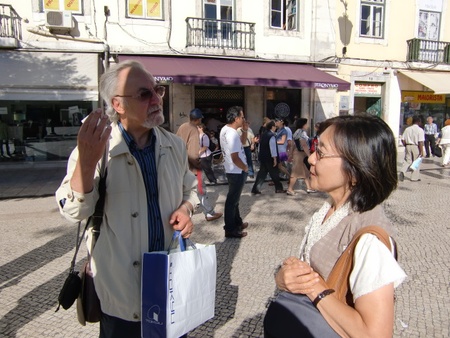The other day I read “ Astro ”, written by Hudson Okada and published on this website and, at the same time, I remembered an event that happened to me years ago.
I was born in the Capital of São Paulo, daughter of a Japanese father and a Nikkei mother, daughter of Japanese immigrants. Therefore, my features are Japanese, so much so that when I'm in Japan, as long as I don't open my mouth, everyone thinks I'm a native Japanese. Yes, because Nikkei (at least we Brazilians) always end up betraying themselves due to their somewhat peculiar pronunciation when speaking Japanese.
During my childhood and adolescence I lived in the Ipiranga neighborhood, on a street where there weren't many Japanese families. So, I thought it was normal for everyone to refer to me as “Japanese”. At school I don't remember if the treatment was the same, as there were a considerable number of students of descent, but I remember the day when the Portuguese teacher was confused by the pronunciation of a Nikkei student and called one by one only the students with the same name. Japanese to speak two words: “grandfather” and “grandmother”. I wanted to know if we knew how to pronounce the closed “o” and the open “o”. This attitude surprised me so much that I don't remember what the result of this investigation was or whether I pronounced the two words satisfactorily.
At college (USP) I also witnessed a similar case, when the Linguistics professor consulted the attendance list and only called those with a Japanese name to answer a trick question.
At the end of the 1970s, my first day as a Portuguese language teacher, I entered the room that was indicated to me and the students immediately said: Teacher, now it's Portuguese class...
They must have thought I was a Mathematics or Science teacher, as Nikkei are more prone to exact sciences.
And so on. Parents of students, when they wanted to talk to me, said: I want to talk to that Japanese teacher. Imagine the work involved in finding out which teacher she would be, as it was a school where the vast majority of teachers were descendants.
Anyway, I spent more than 60 years of my life being called “Japanese”.
But something unprecedented happened when I visited Portugal in 2011.
I stayed in the center of Lisbon, more precisely on Rua Portas de Santo Antão, a picturesque street with old buildings and a variety of typical restaurants, one next to the other.
Well, on the first day, I walked into the restaurant and said: I want grilled sardines and also a caldo verde. That was when the waiter opened his eyes wide and, after taking a breath, exclaimed as if announcing a great discovery: But you speak Portuguese!
In order not to attract the attention of other customers, probably tourists from other countries, I explained that I was born and raised in Brazil, therefore, my native language is Portuguese.
Even so, he said, still in disbelief: But the other Japanese who come here don't speak like you!
I thought: I know, he is referring to the many tourists from Japan who go to visit Portugal and who, at best, only know a few words in Portuguese. But I wanted to taste the sardines so much that I just smiled and said: I'm a Japanese woman who knows your language.
On other days it was the same thing: wherever I went, I just had to say something and the salespeople looked at me in surprise and then I had to introduce myself: I was born in Brazil, I'm Brazilian.
In short, especially the waiters at the Portas de Santo Antão restaurants, when they saw me pointing on the street, said happily: Look at the Brazilian!
It was a feeling of surprise and happy newness that I experienced for the first time in my life!
© 2017 Laura Hasegawa





